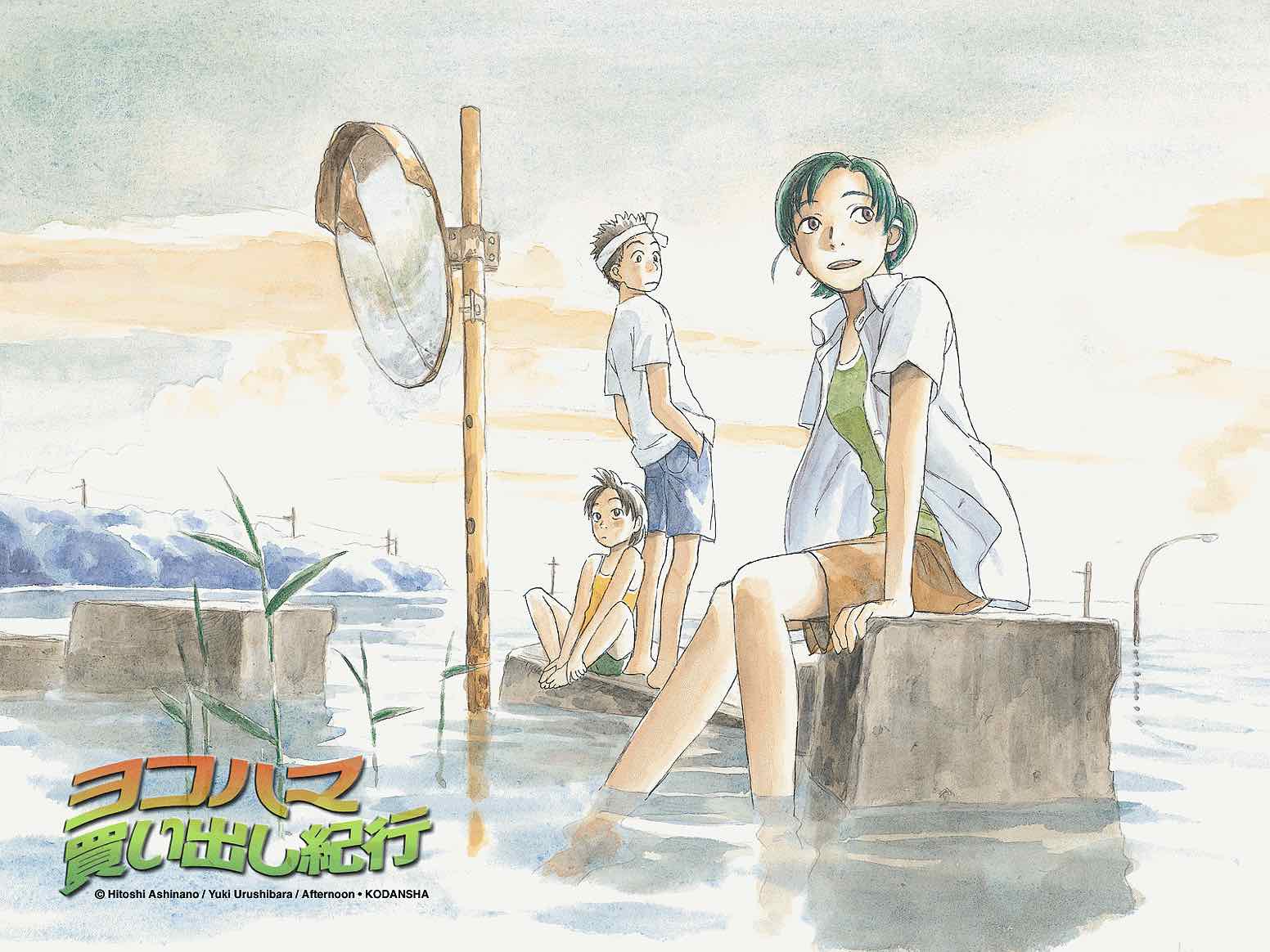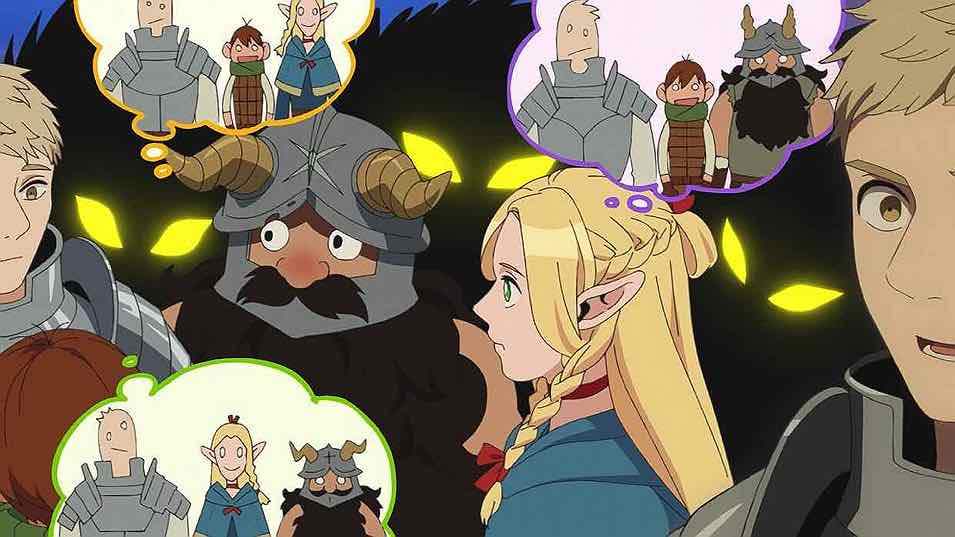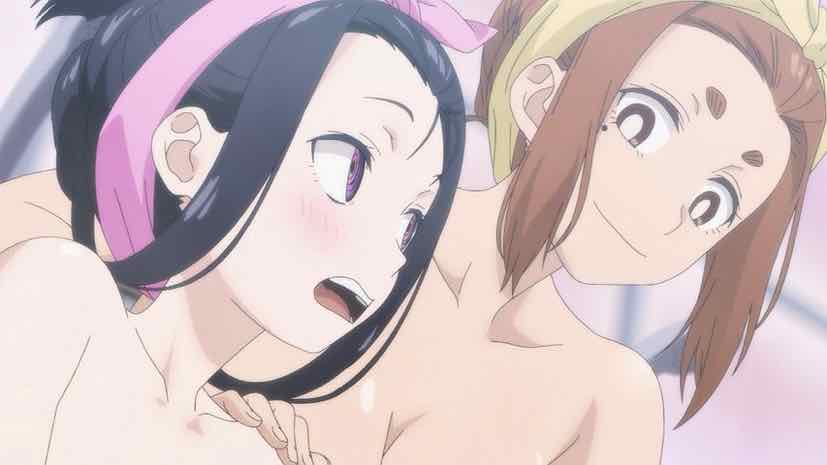#1 – Yokohama Kaidashi Kikou (1994-2006)
I wonder how much of a fait accompli this pick is for most LiA readers, given that it’s not a series I’ve talked about much on the site itself. I think anyone who knows me outside that box was probably expecting it. Yokohama Kaidashi Kikou is not a manga that’s easy to describe in writing. It’s not so much a story as a state of mind. It’s not so much a part of any demographic or genre as the iconic example of them. Ashinano Hitoshi’s work stands as a testament to everything great and powerful and meaningful that manga can be.
YKK is so many things. It’s pretty much the Platonic ideal slice of life, and as such has been hugely influential on that genre. It’s really the definitional seinen for me, along with Haruka na Machi e. The artwork is, for starters, astonishing. I think it stands with Otoyomegatari and Vagabond in its own tier. While it lacks a traditional linear narrative, it tells a very powerful story using vibrant and distinct characters. Not so much with words, but with mood. It’s immersive in a way that makes you rethink ever using that term when talking about any other series.
Yokohama Kaidashi Kikou did receive two short OVA series, with some big names attached. They were fine, but not at all representative of the manga’s brilliance. Remarkably it was never licensed in English until that grievous oversight was finally corrected last year. And that removes the last excuse anyone who loves manga or just brilliant fiction had for not reading it. This series is an experience like none other, one that will move you and maybe even prompt you to look at life in a different way. I can’t praise a series much more highly than that, and I probably won’t have much occasion to.
#2 – Spirit Circle (2012-2016)
In much of the way my #2 pick (FLCL) was the closest thing to a “perfect” series in my noughties list, so it is here with Spirit Circle. It’s a pretty short series (6 volumes) – much shorter than mangaka Mizukami Satoshi’s Sengoku Youko and Hoshi no Samidare. But not a drop of ink is misspent, not a panel is out of place. Spirit Circle is completely on-point from its first panel to its last, and every bit of it is indispnesible.
For a long time the story with Mizukami was anime completely ignoring him despite critical acclaim and decent popularity. That started to change with Planet With, then brutally cratered with Biscuit Hammer, and now we await the arrival of a Sengoku Youko anime. Naturally the best of the lot if them – and to me, the easiest and cheapest to adapt – remains unadapted. The poetry and depth of this remarkable sci-fi fantasy are just about unmatched in manga.
#3 – Hunter X Hunter (1998-present)
Yes, it’s a coincidence that the two most famous hiatus babies in manga are back to back. And it’s pretty clean to me staring at my screen that 1998 was one hell of a year for manga. There’s definitely a touch of wishful thinking in listing both these series as “-present”, but less so with Hunter X Hunter I think. We know Togashi Yoshihiro wants to finish it, no matter how unlikely his devastating back issues make that seem, and we have no real assurances with Inoue. I do know that it’s a shame both these manga are known as much for hiatuses as being masterpieces.
I’ve written more about Hunter X Hunter on LiA than any other series, probably by a lot. At this point there’s not much left unsaid to be honest. It’s great, phenomenal, for me the greatest battle shounen and the greatest Weekly Shounen Jump series ever. Togashi’s writing is astonishingly smart and fearless, and the sheer level of inventiveness he brings to the table almost beggars belief. It’s not as though Hunter X Hunter fans have gotten a raw deal – 37 volumes of manga and two excellent (one historically so) anime adaptations. But one can’t help but greedy, and as with Vagabond I sincerely hope against hope we get to see these superb manga receive a proper conclusion.
#4 – Vagabond (1998-present)
Vagabond is unfortunately known almost as much for its hiatuses (the current one is pushing a decade) as its brilliance. And that’s a shame, both for the hiatuses themselves and the distraction they cause. Because Vagabond is quite simply one of the best manga there is, period. Inoue Takehiko is one of those mangaka who’s so brilliant at both halves of the role that neither can outshine the other. Vagabond is astonishingly beautiful both in terms of art and narrative, and incredibly painful. There are echoes of Miyamoto Mushashi in Himura Kenshin (perhaps not unintentionally) and as one of the most fascinating figures in Japanese history, he makes an almost peerless protagonist (though not this series’ only main character).
Vagabond, at well over 80 million volumes for its 37 volumes, is one of the best-selling manga of all-time, and certainly never to have received an anime. Inoue has said, in fact, that no one has ever approached him about it – a fact I find rather astonishing. Perhaps anime is intimidated by the sheer majesty of the art, as possibly with Otoyomegatari. As to whether Inoue will ever finish it, I doubt even he knows. He’s hinted that he does at least hope to, but he’s so blocked with the series that he sees no path forward. All we can do is hope.
#5 – Haruka na Machi e (A Distant Neighborhood) (1998-1999)
Haruka na Machi e is the shortest manga on this list (I doubt that’s much of a spoiler as it’s only two volumes). But like most of Taniguchi Jiro’s works, it’s exactly as long as it needs to be. The tale of a salaryman who’s transported back into his junior high school body (and life) while visiting his mother’s grave in his hometown, A Distant Neighborhood has not a panel or a work out of place. It’s a profound masterpiece of seinen, for me the apex of Taniguchi’s peerless oeuvre. It’s also been highly influential on manga (and not just manga), which you’ll know if you read it (Boku Dake ga Inai Machi is overtly an homage). Surprisingly it’s never received either an anime or a Japanese live-action adaptation – only the 2010 Belgian film Quartier Lointain. That strikes me as a terrible oversight.
#6 – Cross Game (2005-2010)
Obviously, Adachi Mitsuru’s most famous work is Touch – and it’s a classic. But for my money Cross Game is his magnum opus. One can very much sense the passage of three decades in Adachi’s writing, and in my view for the better. Cross Game is bittersweet, nuanced, and incredibly smart in the way it looks at human relationships. It’s certainly a sports manga in the sense that almost all Adachi’s works are, but as is invariably the case the relationships are the painting – the sport is just the canvas. It has an incredible pair of leads in Kou and Aoba, who together have one of the most fascinating and complicated relationships in manga. The anime is likewise a masterpiece, an adaptation which does full justice to the original without a huge budget (the casting and music is stupendous).
#7 – Rurouni Kenshin (1994-1999)
Any way you slice it, Rurouni Kenshin is one of the landmark shounen of all time. Kenshin himself is probably my favorite protagonist in manga – for me his entire construction is basically perfect, a study in pathos and irony. The Kyoto Arc may be my favorite shounen arc too – it’s certainly in my top three. And mangaka Watsuki Nobuhiro (I won’t rehash the personal controversy here) doesn’t get enough credit for his art, which is every bit the equal of his storytelling skills. The only question for me, really, was whether to include the currently serialized Hokkaido manga as part of the main series for these purposes, but I think it’s most accurately described as a sequel.
#8 – Otoyomegatari (2008-present)
I do worry about recency bias when I do lists like this, but I can’t let something like that guide my choices. Otoyomegatari was never not going to be on this list. For one, it may be the most beautiful manga ever drawn. That in itself would make it a tough out for this list, bit Mori Kaoru also happens to be a great storyteller. She handles a potentially thorny romance by modern standards (but perfectly acceptable in context) with incredible grace and dexterity. She offers a great supporting cast and a fascinating narrative structure, and every chapter is a bit of a history and anthropology lesson. The only complaint I have is that I wish Otoyomegatari was updated more often. But compared to some manga I could (and maybe will, who knows) mention, it’s practically an embarrassment of riches.
#9 – Akatsuki no Yona (2009-present)
This is in no way a “token shoujo” on the list. Akatsuki no Yona absolutely deserves to be here on its own merits. For 14 years it’s been amazingly consistent despite some big tonal shifts from arc to arc. This is one of those series that pretty much has it all – great protagonists, incredible supporting cast (Yoon is my personal favorite), and one of the best, most coherent, nuanced plots in fantasy. It’s a shame the anime only got two cours (and they were damn good ones), but the manga shows no signs of slowing down even if it giving hints that it might be entering its final stages.
#10 – Baby Steps (2007-2017)
The last spot on these top 10 lists is always harder than the first. In the end, Baby Steps had to be on here, because it may be the best pure sports manga ever written. There are other elements (like romance) here, and they’re great. But at heart Baby Steps is all about the sport, and its attention to detail is astonishing. It also has one of the best protagonists in manga history. The four-cour anime adaptation is very good, but the manga is this series at its best (even if it was reportedly forced to end prematurely, one of the great travesties in manga publishing).
Let’s get this party started! As with the Noughties list, I’m going to cheat by starting with an…
Honorable Mention – Boku no Kokoro no Yabai Yatsu (2018-present)
OK, I admit it, this is a bit of a cheat. Truthfully, BokuYaba is a series I couldn’t quite slide into the top 10. But I couldn’t bring myself to leave out a series I love as much as any I’ve read in a very long time. Again, this list is personal, and this is the ultimate expression of that. Little more need to said about why I love it so much – manga romance and romcom protagonists just don’t get much better. By the end, it might very well have worked its way onto a theoretical list like this without need of a wild card.
I’m excited to begin another LiA crowdsourcing project! This time around it’s my top 10 manga of all-time. We didn’t hit quite the same levels of support we did for the “Best of the 2000’s” project, but thanks to your generosity we cleared Tier 2. That means a full top 10 manga, list, with a short summary of why I made each pick. Here are the folks who stepped up and supported this project on Ko-fi:
- Riv
- Nicc
- Red
- Stephen
- Ryan
Of course, those folks will once again get a one-week special sneak preview of my picks, along with my deepest gratitude. I’ll be going in countdown form again, starting with the supporters and going live here on 9/2/23.
As for the list, it goes without saying that it was incredibly difficult to put together. I think I should also reiterate that this is in no way an attempt to create a “best” list – these are my personal favorites, no more and no less. And given that the pool of manga I haven’t read is vastly deeper than the pool of manga I have, there are going to be series not on my list that many of you think should be (and would be on yours).
Unlike with the year-end and decade anime lists, I don’t see any particularly tricky eligibility questions. The only restriction is that it must be a manga – originally written in Japanese and published in Japan. And I’m not restricting myself to completed series – if an ongoing manga is on here, it’s based on the published and translated chapters to date.
Finally, let’s do another contest, as those seem to be natural for any top 10 list. I’ll leave this open until I post #10 – take your best shot just like with Best of the 2000’s list The winner gets a haiku about any series on the list, their choice.





Pastuzo
September 6, 2023 at 8:36 pmJust looked into how this manga had ended without closure. There was plan to write more arcs. I am curious as to really why it had ended, apparently the sales weren’t too bad compare to other series in the publication at the time. I see fans are really hoping for a continuation.
Collectr
September 7, 2023 at 8:48 amThere’s so much material in the Akatsuki no Yona manga beyond the two anime seasons and three OVAs that it would be possible to do ANOTHER two seasons and just catch up. The difference in treatment between Saiunkoku Monogatari (78 episodes in two distinct halves) and Akatsuki no Yona (24 episodes + 3 OVAs) illustrates the changes (decline, to be blunt) in the anime industry from 2006 to a decade later. I do hope the manga concludes soon. I want to know how the central triangle (Yona, Hak, Su Won) resolves!
Guardian Enzo
September 7, 2023 at 1:04 pmWell sure, it richly deserves far more anime (that will not be an uncommon theme in this list). But shoujo especially has declined tremendously in anime over the decades. Shoujo rarely get adapted at all these days (they get dramas if anything), and rarely for more than a cour. That’s why the Netflix announcement on Kimi no Todoke (not a series I follow, but never mind) is so surprising.
Akatsuki no Yona kind of transcends demographic for me. It’s just a great fantasy, plain and simple.
KlingKlang
September 8, 2023 at 12:18 amJust a heads up – Otoyomegatari Chapter 106 is out.
Guardian Enzo
September 8, 2023 at 6:31 amNoted, thank you.
Brian Guy
September 14, 2023 at 12:00 amVery glad to see someone other than me bring up Baby Steps (aka “Moneyball But For Tennis”). I am somewhat surprised it hasn’t had much impact on recent sports titles (Spring Of Little Me is the only one in the last couple of years that I’m aware shares any DNA with it), but that just shows how special it really is.
One thing: Don’t read this and Good Ending simultaneously unless you want some weird bleed-through effects.
Guardian Enzo
September 14, 2023 at 6:55 amYeah, I like Spring of Little Me a lot actually. Another sleeper sports manga.
Cross
September 15, 2023 at 7:10 pmHello there fellow weeb I mean blogger. I’m just reaching out to you because about a month ago I created a similar blog to yours in the anime niche, and I’ll be writing articles over there for a long time. Probably until the end of time lol. And so I thought it would be pretty sick if you would allow to me to create a guest post on your dank blog if youd be willing. A post that also includes my link in it as well. I’ll write an article hopefully up to your standards, hope to hear from ya.
My website is https://weebcafe.com
Still a new blog but I’ll be hitting the content hard and I totally enjoy making it.
-Cross
Red
September 16, 2023 at 2:13 pmThanks for making this list, will be adding a couple more to my backlog.
Biggest surprise was Hunter x Hunter, wouldn’t have expected it to have already reached that high on your list since you were mostly anime only.
Guardian Enzo
September 16, 2023 at 3:31 pmI think that spot in pretty justified. Nobody else in shounen does what Togashi does.
Riv
September 17, 2023 at 2:17 amThank you for this list! I’ve added several to my “to read” list. I need to get the latest volume of Yona too and check if Otoyomegatari has a new one. Glad they both made it on here.
Guardian Enzo
September 17, 2023 at 8:19 amYou’re very welcome, and thank you to the patrons who made it possible!
Derrick
September 18, 2023 at 6:46 pmHey, thanks a lot for Haruka na Machi e .
As a 30 somethings male, this resonates deep; both MC and his father.
Really, it’s just too profound.
this kind of work is what makes humanity worth it; something both avant garde and down to earth.
Guardian Enzo
September 18, 2023 at 8:33 pmIt’s a concise, flawless masterpiece. Not a superfluous note in the entire score.
slazer
September 19, 2023 at 9:16 amEnjoyed this a lot, Enzo! Definitely was blindsided by YKK but I guess that’s just cause to give it a read!